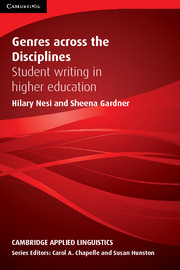Book contents
- Frontmatter
- Contents
- Series editors’ preface
- Abbreviations
- Acknowledgements
- Part I Investigating Student Writing: From Corpus to Genre Family
- 1 Investigating student writing with the BAWE corpus
- 2 Families of genres of assessed writing
- Part II Social Functions of University Student Writing
- 3 Demonstrating knowledge and understanding
- 4 Developing powers of informed and independent reasoning
- 5 Developing research skills
- 6 Preparing for professional practice
- 7 Writing for oneself and others
- 8 Networks across genres and disciplines
- Appendices
- Index
Series editors’ preface
Published online by Cambridge University Press: 07 January 2021
- Frontmatter
- Contents
- Series editors’ preface
- Abbreviations
- Acknowledgements
- Part I Investigating Student Writing: From Corpus to Genre Family
- 1 Investigating student writing with the BAWE corpus
- 2 Families of genres of assessed writing
- Part II Social Functions of University Student Writing
- 3 Demonstrating knowledge and understanding
- 4 Developing powers of informed and independent reasoning
- 5 Developing research skills
- 6 Preparing for professional practice
- 7 Writing for oneself and others
- 8 Networks across genres and disciplines
- Appendices
- Index
Summary
This study of writing by undergraduate students in the UK draws on one of the largest collections of student essays ever made: the British Academic Written English (BAWE) corpus. It introduces the surprising variety of genres used by students today, from the traditional essay or lab report to more exploratory genres, such as the reflective essay or the personal narrative. Comparisons are made between disciplines, including Sciences, Engineering, Humanities and Social Sciences, and between students at different stages in their study.
Professor Nesi and Dr Gardner use a variety of methods in investigating their corpus, so that the book is a demonstration of how to proceed with such an investigation as well as a report of its outcome. Methods include the identification of moves in a genre, the comparison of frequencies of a variety of language features, and more detailed investigations of individual words and phrases. The book demonstrates how these methods work together to provide a picture of writing practices.
Each chapter of the book considers a ‘family’ of genres, each of which is linked to a social function. These are: ‘demonstrating knowledge and understanding’; ‘critical evaluation and developing arguments’; ‘developing research skills’; ‘preparing for professional practice’; and ‘writing for oneself and others’. These functions map on to stages in the student’s university life, from understanding new concepts to undertaking independent research and preparing to enter the world of work.
The book has many purposes. On the one hand it provides documentation on the range of writing produced by students in one educational system. It will inform courses and materials that prepare students who are entering that system to succeed in the tasks they are set. It will assist teachers and assessment specialists by providing information about assessment task outcomes: put simply, does the task produce the kind of writing, and the evidence of thought, that the assessors expect? On the other hand, it provides an example of how research of this kind might be undertaken, demonstrating the congruence of qualitative and quantitative methodologies, including the classification of thousands of individual texts and the comparative analysis of multiple sub-corpora. The book meets the needs of two kinds of Applied Linguists: the practitioner (what is it that university students in each year of their study need to know how to do?) and the researcher (how do I extract meaningful information from a multidimensional collection of texts?).
- Type
- Chapter
- Information
- Genres across the DisciplinesStudent Writing in Higher Education, pp. ix - xPublisher: Cambridge University PressPrint publication year: 2012



